英语语法----介词Preposition(Prep.)
英语语法----介词Preposition(Prep.)
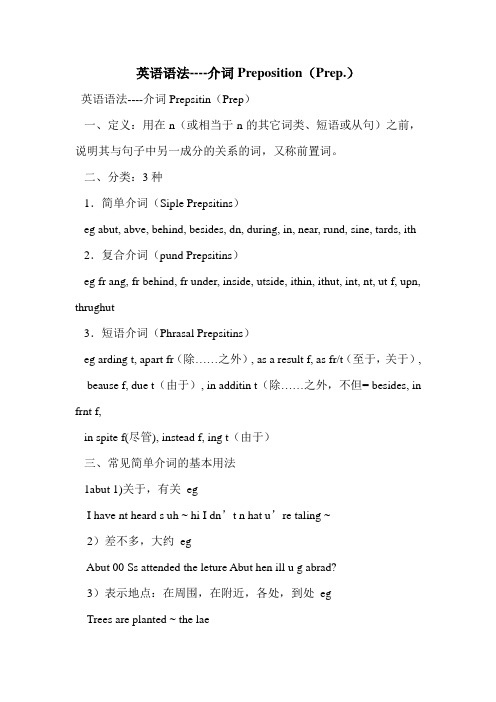
英语语法----介词Preposition(Prep.)英语语法----介词Prepsitin(Prep)一、定义:用在n(或相当于n的其它词类、短语或从句)之前,说明其与句子中另一成分的关系的词,又称前置词。
二、分类:3种1.简单介词(Siple Prepsitins)eg abut, abve, behind, besides, dn, during, in, near, rund, sine, tards, ith 2.复合介词(pund Prepsitins)eg fr ang, fr behind, fr under, inside, utside, ithin, ithut, int, nt, ut f, upn, thrughut3.短语介词(Phrasal Prepsitins)eg arding t, apart fr(除……之外), as a result f, as fr/t(至于,关于), beause f, due t(由于), in additin t(除……之外,不但= besides, in frnt f,in spite f(尽管), instead f, ing t(由于)三、常见简单介词的基本用法1abut 1)关于,有关egI have nt heard s uh ~ hi I dn’t n hat u’re taling ~2)差不多,大约egAbut 00 Ss attended the leture Abut hen ill u g abrad?3)表示地点:在周围,在附近,各处,到处egTrees are planted ~ the laeThe live sehere~ the Peple’s SquareDn’t leave ur bs~ ur des I haven’t an sall hange ~/n e 4)“即将”(近期将)egThe fil is ~ t begin It’s nearl 7:00 The train is ~ t leave2abve 1)在……上方egA bird is fling abve the ds There is a prtrait abve the blabard 2)(在数量上)超过egThe an is nt et frt, but ell ~thirtThe nuber f ne Ss this ear is ~fur hundred3)(能力等)胜过,超越;因太困难、太好而不…… eg The prble is ~ e (这问题太难我不懂。
英语语法 介词在句子中起什么作用
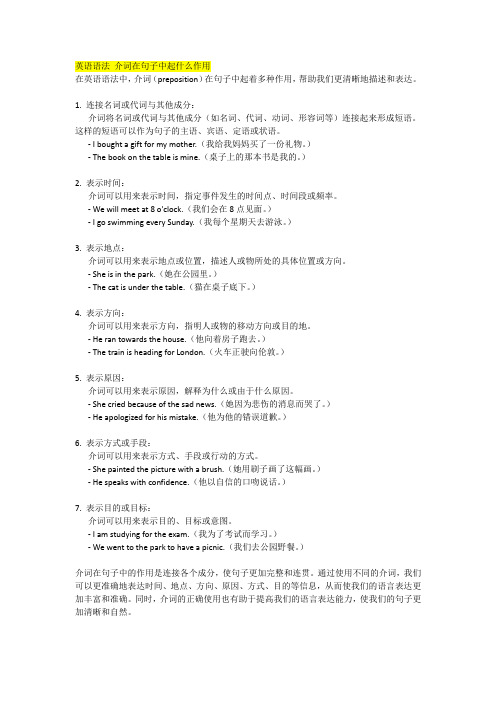
英语语法介词在句子中起什么作用在英语语法中,介词(preposition)在句子中起着多种作用,帮助我们更清晰地描述和表达。
1. 连接名词或代词与其他成分:介词将名词或代词与其他成分(如名词、代词、动词、形容词等)连接起来形成短语。
这样的短语可以作为句子的主语、宾语、定语或状语。
- I bought a gift for my mother.(我给我妈妈买了一份礼物。
)- The book on the table is mine.(桌子上的那本书是我的。
)2. 表示时间:介词可以用来表示时间,指定事件发生的时间点、时间段或频率。
- We will meet at 8 o'clock.(我们会在8点见面。
)- I go swimming every Sunday.(我每个星期天去游泳。
)3. 表示地点:介词可以用来表示地点或位置,描述人或物所处的具体位置或方向。
- She is in the park.(她在公园里。
)- The cat is under the table.(猫在桌子底下。
)4. 表示方向:介词可以用来表示方向,指明人或物的移动方向或目的地。
- He ran towards the house.(他向着房子跑去。
)- The train is heading for London.(火车正驶向伦敦。
)5. 表示原因:介词可以用来表示原因,解释为什么或由于什么原因。
- She cried because of the sad news.(她因为悲伤的消息而哭了。
)- He apologized for his mistake.(他为他的错误道歉。
)6. 表示方式或手段:介词可以用来表示方式、手段或行动的方式。
- She painted the picture with a brush.(她用刷子画了这幅画。
)- He speaks with confidence.(他以自信的口吻说话。
英语语法 什么是介词短语

英语语法什么是介词短语介词短语(Prepositional Phrase)是由介词(preposition)及其后面的名词短语构成的短语结构。
介词短语在句子中可以充当多种不同的语法角色和提供额外的信息。
以下是介词短语的详细解释:1. 结构:介词短语由一个介词和介词后面的名词短语构成,名词短语可以包括名词、代词、动名词、名词性从句等。
例如:- in the park(在公园里)- with a friend(和一个朋友)- after finishing the exam(考试结束后)2. 作用:介词短语在句子中可以充当多个不同的语法角色,包括定语、状语、宾语补足语等。
具体的作用取决于介词短语在句子中的位置和语境。
以下是介词短语的常见作用:a. 定语(Modifier):介词短语可以用作句子中的定语,修饰名词或代词,提供额外的描述或限制。
例如:- The book on the table is mine.(桌子上的书是我的。
)- The girl with a red hat is my sister.(戴着红帽子的女孩是我妹妹。
)b. 状语(Adverbial):介词短语可以用作句子中的状语,修饰动词、形容词或整个句子,提供关于时间、地点、方式、原因等方面的信息。
例如:- She went to the park with her friends.(她和她的朋友们去了公园。
)- He spoke in a calm voice.(他以平静的声音说话。
)c. 宾语补足语(Object Complement):介词短语可以用作句子中的宾语补足语,补充说明或描述动作的结果或状态。
例如:- I found the key under the bed.(我在床底下找到了钥匙。
)- They painted the house in bright colors.(他们用鲜艳的颜色给房子涂上了漆。
)3. 介词的常见用法:介词短语的种类很多,常见的介词包括:at、in、on、for、with、by、from、to、through、under、over、above、below、between、among等。
英语词性缩写的解释

英语词性缩写的解释英语词性缩写是一种常见的在英语语法中使用的标记方式,用于表示单词的词性。
下面是一些常见的英语词性缩写及其解释:- n.:名词(noun)。
名词用来表示人、物、地方或抽象概念。
n.:名词(noun)。
名词用来表示人、物、地方或抽象概念。
- v.:动词(verb)。
动词用来表示行为、状态或情感。
v.:动词(verb)。
动词用来表示行为、状态或情感。
- adj.:形容词(adjective)。
形容词用来描述名词的特征或性质。
adj.:形容词(adjective)。
形容词用来描述名词的特征或性质。
- adv.:副词(adverb)。
副词用来修饰动词、形容词或其他副词。
adv.:副词(adverb)。
副词用来修饰动词、形容词或其他副词。
- pron.:代词(pronoun)。
代词用来替代名词或名词短语。
pron.:代词(pronoun)。
代词用来替代名词或名词短语。
- prep.:介词(preposition)。
介词用来表示时间、位置、关系等。
prep.:介词(preposition)。
介词用来表示时间、位置、关系等。
- conj.:连词(conjunction)。
连词用来连接词语或句子。
conj.:连词(conjunction)。
连词用来连接词语或句子。
- interj.:感叹词(interjection)。
感叹词用来表示强烈的情感或反应。
interj.:感叹词(interjection)。
感叹词用来表示强烈的情感或反应。
以上只是一些常见的英语词性缩写,常用于词典、语法书和学术文献中。
有时候会使用其他缩写来表示更具体的词性,例如:- pl.:复数(plural)。
表示名词的复数形式。
pl.:复数(plural)。
表示名词的复数形式。
- poss.:所有格(possessive)。
表示名词的所有格形式。
poss.:所有格(possessive)。
表示名词的所有格形式。
在阅读英语文献或学习英语语法时,了解这些词性缩写可以帮助我们更好地理解和运用英语。
(完整word版)介词用法归纳,推荐文档
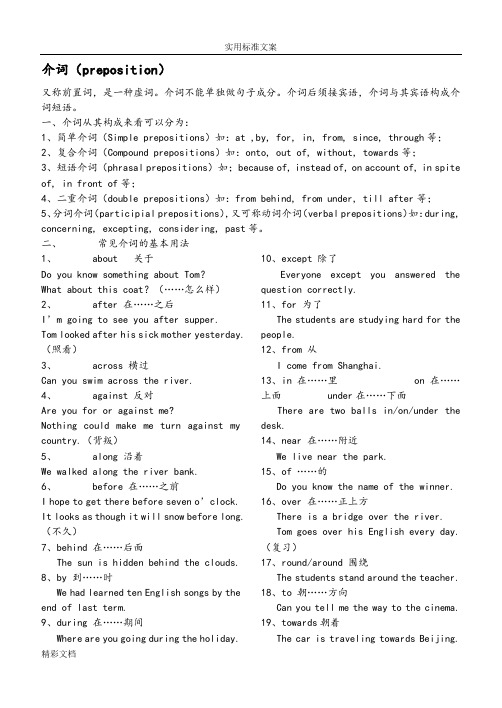
介词(preposition)又称前置词,是一种虚词。
介词不能单独做句子成分。
介词后须接宾语,介词与其宾语构成介词短语。
一、介词从其构成来看可以分为:1、简单介词(Simple prepositions)如:at ,by, for, in, from, since, through等;2、复合介词(Compound prepositions)如:onto, out of, without, towards等;3、短语介词(phrasal prepositions)如;because of, instead of, on account of, in spite of, in front of等;4、二重介词(double prepositions)如:from behind, from under, till after等;5、分词介词(participial prepositions),又可称动词介词(verbal prepositions)如:during, concerning, excepting, considering, past等。
二、常见介词的基本用法1、 about 关于Do you know something about Tom?What about this coat?(……怎么样)2、 after 在……之后I’m going to see you after supper. Tom looked after his sick mother yesterday.(照看)3、 across 横过Can you swim across the river.4、 against 反对Are you for or against me?Nothing could make me turn against my country.(背叛)5、 along 沿着We walked along the river bank.6、 before 在……之前I hope to get there before seven o’clock. It looks as though it will snow before long.(不久)7、behind 在……后面The sun is hidden behind the clouds.8、by 到……时We had learned ten English songs by the end of last term.9、during 在……期间Where are you going during the holiday. 10、except 除了Everyone except you answered the question correctly.11、for 为了The students are studying hard for the people.12、from 从I come from Shanghai.13、in 在……里 on 在……上面 under在……下面There are two balls in/on/under the desk.14、near 在……附近We live near the park.15、of ……的Do you know the name of the winner.16、over 在……正上方There is a bridge over the river.Tom goes over his English every day.(复习)17、round/around 围绕The students stand around the teacher.18、to 朝……方向Can you tell me the way to the cinema.19、towards朝着The car is traveling towards Beijing.20、with 和……一起me?Would you like to go to the cinema with学习这些介词时可以先记住它的汉语意思,然后参照例句来加深理解,并在今后的学习中加以灵活运用。
初中英语语法基础知识汇总介词
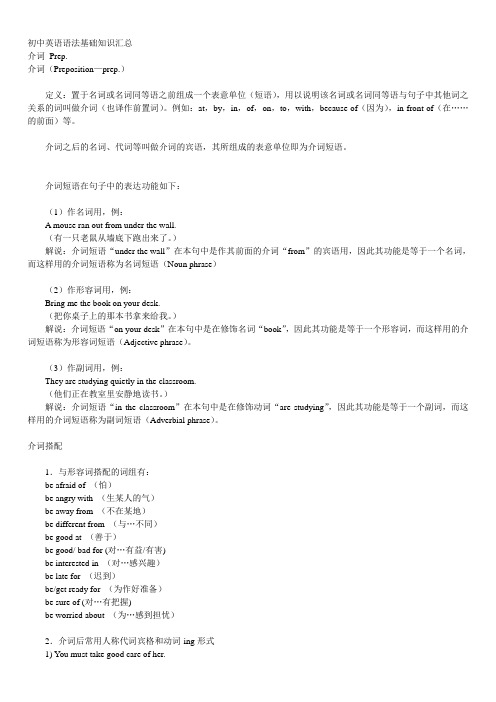
初中英语语法基础知识汇总介词Prep.介词(Preposition—prep.)定义:置于名词或名词同等语之前组成一个表意单位(短语),用以说明该名词或名词同等语与句子中其他词之关系的词叫做介词(也译作前置词)。
例如:at,by,in,of,on,to,with,because of(因为),in front of(在……的前面)等。
介词之后的名词、代词等叫做介词的宾语,其所组成的表意单位即为介词短语。
介词短语在句子中的表达功能如下:(1)作名词用,例:A mouse ran out from under the wall.(有一只老鼠从墙底下跑出来了。
)解说:介词短语“under the wall”在本句中是作其前面的介词“from”的宾语用,因此其功能是等于一个名词,而这样用的介词短语称为名词短语(Noun phrase)(2)作形容词用,例:Bring me the book on your desk.(把你桌子上的那本书拿来给我。
)解说:介词短语“on your desk”在本句中是在修饰名词“book”,因此其功能是等于一个形容词,而这样用的介词短语称为形容词短语(Adjective phrase)。
(3)作副词用,例:They are studying quietly in the classroom.(他们正在教室里安静地读书。
)解说:介词短语“in the classroom”在本句中是在修饰动词“are studying”,因此其功能是等于一个副词,而这样用的介词短语称为副词短语(Adverbial phrase)。
介词搭配1.与形容词搭配的词组有:be afraid of (怕)be angry with (生某人的气)be away from (不在某地)be different from (与…不同)be good at (善于)be good/ bad for (对…有益/有害)be interested in (对…感兴趣)be late for (迟到)be/get ready for (为作好准备)be sure of (对…有把握)be worried about (为…感到担忧)2.介词后常用人称代词宾格和动词-ing形式1) You must take good care of her.2) Thank you for teaching us so well.3.几组易混淆的介词A.“在...之后”in + 一段时间(用于一般将来时)after + 一段时间(用于一般过去时)after + 一点时间(常用于一般将来时)如:The baby stopped crying after half an hour.The baby will stop crying in half an hour.They will visit their teacher after Friday.B.for +一段时间since +过去的一点时间这两者均用于现在完成时,具体在时态部分,我会继续向同学们讲解。
英语语法----介词Preposition(Prep.)
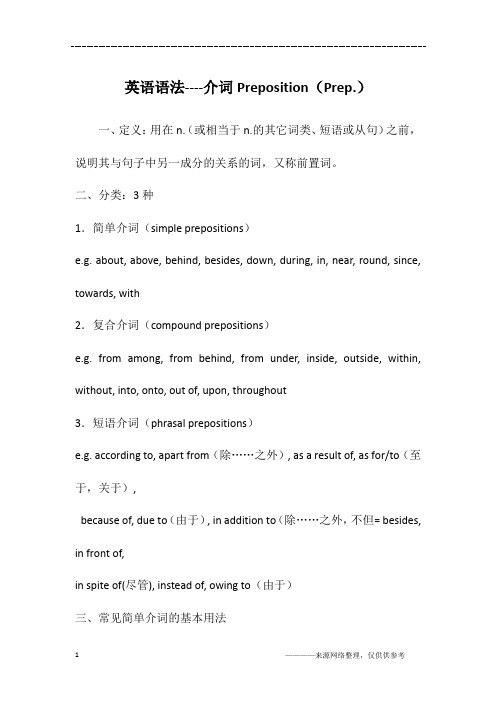
英语语法----介词Preposition(Prep.)一、定义:用在n.(或相当于n.的其它词类、短语或从句)之前,说明其与句子中另一成分的关系的词,又称前置词。
二、分类:3种1.简单介词(simple prepositions)e.g. about, above, behind, besides, down, during, in, near, round, since, towards, with2.复合介词(compound prepositions)e.g. from among, from behind, from under, inside, outside, within, without, into, onto, out of, upon, throughout3.短语介词(phrasal prepositions)e.g. according to, apart from(除……之外), as a result of, as for/to(至于,关于),because of, due to(由于), in addition to(除……之外,不但= besides, in front of,in spite of(尽管), instead of, owing to(由于)三、常见简单介词的基本用法1.about 1)关于,有关e.g.i have not heard so much ~ him. i don’t know what you’re talking ~. 2)差不多,大约e.g.about 500 ss attended the lecture. about when will you go abroad?3)表示地点:在周围,在附近,各处,到处e.g.trees are planted ~ the lake.they live somewhere~ the people’s square.don’t leave your books~ your desk. i haven’t any small change ~/on me.4)“即将”(近期将来)e.g.the film is ~ to begin. it’s nearly 7:00. the train is ~ to leave.2.above 1)在……上方e.g.a bird is flying above the woods. there is a portrait above the blackboard. 2)(在数量上)超过e.g.the man is not yet forty, but well ~thirty.the number of new ss this year is ~four hundred.3)(能力等)胜过,超越;因太困难、太好而不……e.g.the problem is ~ me. (这问题太难我不懂。
外研版高中英语语法总结(详尽)
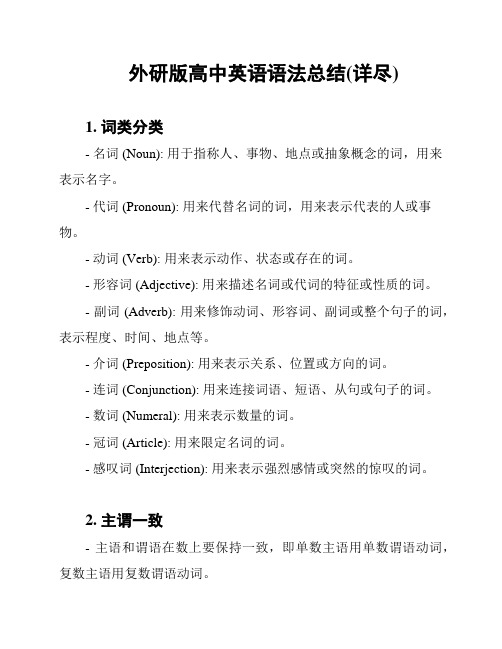
外研版高中英语语法总结(详尽)1. 词类分类- 名词 (Noun): 用于指称人、事物、地点或抽象概念的词,用来表示名字。
- 代词 (Pronoun): 用来代替名词的词,用来表示代表的人或事物。
- 动词 (Verb): 用来表示动作、状态或存在的词。
- 形容词 (Adjective): 用来描述名词或代词的特征或性质的词。
- 副词 (Adverb): 用来修饰动词、形容词、副词或整个句子的词,表示程度、时间、地点等。
- 介词 (Preposition): 用来表示关系、位置或方向的词。
- 连词 (Conjunction): 用来连接词语、短语、从句或句子的词。
- 数词 (Numeral): 用来表示数量的词。
- 冠词 (Article): 用来限定名词的词。
- 感叹词 (Interjection): 用来表示强烈感情或突然的惊叹的词。
2. 主谓一致- 主语和谓语在数上要保持一致,即单数主语用单数谓语动词,复数主语用复数谓语动词。
3. 宾语- 宾语是及物动词的补充部分,表示动作的对象或受事者。
- 直接宾语 (Direct Object): 直接受动作的对象,回答“谁”或“什么”。
- 间接宾语 (Indirect Object): 间接受动作的对象,回答“给谁”或“送给谁”。
4. 定语- 定语用来修饰名词或代词,在句中作为前置或后置修饰语。
5. 状语- 状语用来修饰动词、形容词、副词或整个句子,在句中充当状语成分。
6. 从句- 从句是一个包含有主语和谓语的句子,作为主句或其它从句的一部分。
7. 并列连词- 并列连词用来连接并列的词、短语、从句或句子。
8. 时态- 英语动词有如下的时态:一般现在时、一般过去时、一般将来时、现在进行时、过去进行时、将来进行时、现在完成时、过去完成时、将来完成时。
9. 被动语态- 被动语态用于表示主语是动作的承受者,动作由别人施加。
10. 倒装句- 倒装句是将主语和谓语的位置颠倒,用来强调某种信息或改变语气。
- 1、下载文档前请自行甄别文档内容的完整性,平台不提供额外的编辑、内容补充、找答案等附加服务。
- 2、"仅部分预览"的文档,不可在线预览部分如存在完整性等问题,可反馈申请退款(可完整预览的文档不适用该条件!)。
- 3、如文档侵犯您的权益,请联系客服反馈,我们会尽快为您处理(人工客服工作时间:9:00-18:30)。
英语语法----介词Preposition(Prep.)英语语法----介词Prepsitin(Prep)一、定义:用在n(或相当于n的其它词类、短语或从句)之前,说明其与句子中另一成分的关系的词,又称前置词。
二、分类:3种1.简单介词(Siple Prepsitins)eg abut, abve, behind, besides, dn, during, in, near, rund, sine, tards, ith 2.复合介词(pund Prepsitins)eg fr ang, fr behind, fr under, inside, utside, ithin, ithut, int, nt, ut f, upn, thrughut3.短语介词(Phrasal Prepsitins)eg arding t, apart fr(除……之外), as a result f, as fr/t(至于,关于), beause f, due t(由于), in additin t(除……之外,不但= besides, in frnt f,in spite f(尽管), instead f, ing t(由于)三、常见简单介词的基本用法1abut 1)关于,有关egI have nt heard s uh ~ hi I dn’t n hat u’re taling ~2)差不多,大约egAbut 00 Ss attended the leture Abut hen ill u g abrad?3)表示地点:在周围,在附近,各处,到处egTrees are planted ~ the laeThe live sehere~ the Peple’s SquareDn’t leave ur bs~ ur des I haven’t an sall hange ~/n e 4)“即将”(近期将)egThe fil is ~ t begin It’s nearl 7:00 The train is ~ t leave2abve 1)在……上方egA bird is fling abve the ds There is a prtrait abve the blabard 2)(在数量上)超过egThe an is nt et frt, but ell ~thirtThe nuber f ne Ss this ear is ~fur hundred3)(能力等)胜过,超越;因太困难、太好而不…… eg The prble is ~ e (这问题太难我不懂。
)hn is ~ all the ther Ss in atheatis3arss 1)在……对面/对过egunle lives ~ he There is a bshp ~ the street2)横越,横过egThe little girl helped the blind an ~ the riverThe tall tree fell dn ~ the street3)经过…… egThe revlutin develped arss the hle entur4after 1)在……后(时间)egAfter r/lass, e ent he exept hiThe da ~ trr e ill g t Shanghai2)在……的后面(顺序)egPlease shut/ lse the dr after/behind u3)仿照,按照(引申意义)egRead after e , please Rerite the flling sentenes ~ the delA ne hurh ill be built ~the ld ne4)追求(引申意义)eghat are u after? h, here is the thing I’afterIf u run ~ t hares, u’ll ath neither)固定词组:egafter all l after = tae are fagainst 1)靠,倚,碰egThe rain as beating~ the inds He put the ladder against the all He as leaning ~the ind, reading The an sa a hare run ~ a tree 2)反对,禁止(引申意义)ege are fr peae and ~ar Is there anbd ~ the suggestin?3)违反,违背(引申意义)egThis sentene is ~graarIn the ld das girls ere arried ~ their n illNbd shuld d anthing ~the la4)顶着,对着ege plaed the first half (上半场)~ the indLearning is lie sailing a bat ~ the urrent(气流)治学如同逆水行舟。
)防备,准备(引申意义)egThe saved fire d(干柴)~ inter an is fighting a battle ~ pllutin 6alng 顺着,沿着egTrees are planted ~ the streetaling ~ Naning Rad esterda, I et an ld friend f ine7ang 在……当中/中间≥3 egXia Sun is the best ne ~ his lassates The teaher is sitting~ the Ss 8arund 1)在……的周围,围绕egShe ears a nelae/ath ~ her ne/ristThe earth turns /ges/ travels ~ the sun2)在……各处egHe did a lt f travel ~ the untr during the suer hlidase shed ur apanese friends ~ ur shl3)大约(时间、数量)egarund / abut thirt ears ld A big elephant a eigh ~five tns4)在……那边egThere is a shl shp ~ the shl librarArund the rner f the street, u’ll see a send-hand bshp(旧书店)9at 1)表示时间、地点、价钱、速度、年龄egat ten ’l at the shl at the age f 40at (a speed f ) 10 iletres an hurPeple lie t bu eggs fr hi beause he sells at a ler prieNte: 表示价格时,at须和prie连用,如只说具体价钱,则用。
eg I bught this ditinar fr 60 uan2)表示动作之方向、目的:朝,向egHe thre a stne at a dg The fx ran at the bHe sht at the bird, but issed it /didn’t sht it3)处于某种状态(引申意义)ege are at eeting The t untries are at ar4)表示引起某种情绪的原因。
ege are surprised at ur suess The ere sad at hearing suh bad nes)在……号召,召集,请求下(引申意义)egHe rte the letter at ur requestIn tber 1986, Queen Elizabeth II f the Great Britain visited hina atthe invitatin f the hinese gvernent6)固定词组中:egat first, at last, at (the )st, at (the )least, at ne, at present, at he,at night, at the beginning, at the sae tie, nt at all et10befre 1)在……的前面(位置)反义behind egHe as standing ~ the lass, read t speaNever put the art befre the hrse 不要本末倒置。
2)在……以前(时间)反义after egHand in ur paper~ Sunda e get up ~ six ever rning11behind 1)在……的后面(位置)egThe garage(车库)is ~ the huse He ae ut fr ~ the dr2)迟于,晚于,误时/点egThe train is behind tieThe plane as t hurs ~ tie beause f the str3)劣于,不如,落后egld father is behind the tiesBeause f his illness, he is ~ the thers in his studies12bel 1)在……下面egHis ffie is bel ine The teperature tda is ~ freezing pint2)低于egHe is bel e in the lass13beside 1)在……的旁边egHe sat beside e at dinner The it’s largest stadiu stands ~ a lae 2)相比(引申意义)egEnglish is pr beside urs3)离题,与……无关egThis is ~ the tpi fr disussinhat u are taling abut is ~the pint14besides 除……之外(还)ege all ent t Beiing ~ ur teaherI lie atheatis, phsis, besides EnglishBesides being the largest it in hina, Shanghai is als the entre f industr, eduatin, siene and ultureBesides:表示加法,“除了……还有……”Exept:表示减法,“把……不算在其中” egHe lies different inds f sprts besides ftballHe lies different inds f sprts exept ftball其它运动项目+ 足球≠足球不在内的多种不同运动项目Nte: expet fr (除去部分与前面叙述内容不属于同一范畴)eg His psitin is gd exept fr se spelling istaes(expet fr在意义上=exept that)1beteen 1) 在两者之间ege t ffie beteen 10 and 11 ’lhat’s the di fferene beteen“beteen”and“ang”?2)表示两者以上的相互关系egAfter the eah tuhed the elephant, the six blind en quarreled beteen theselvesThere is se little differene beteen the three rdsNte: beteen ≈ ang egThe village lies beteen the three hills The teaher is sitting ang the Ss 16bend 1)远在……之外egThe ae fr bend the seas (海外)The aident happened bend the squareBend the village is a river 村那面有条河2)超过,胜过,为……所不及egThe b is bend e 这本书我看不懂。
